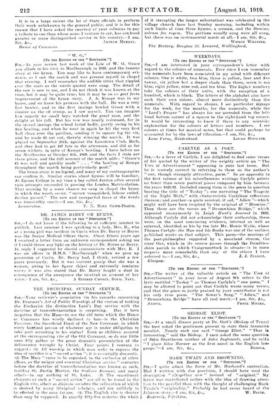" W. (3."
[TO THE EDITOR OF THE " SPECTATOR."]
SIR,—In your review last week of the Life of W. G. Grace you allude to his visit to Marlborough in 1869, and the famous story of the hymn. You may like to have contemporary evi- dence, as 1 saw the match and was present myself in chapel that evening. I well remember the audible titter that rippled over the seats as the words quoted were sung. The detail of the vow is new to me, and I do not think it was known at the time, but it may be quite true; but it may be an ex post facto improvement of the hymn story. J. A. Serape was in my house, and we knew his prowess with the ball. He was a very fast bowler, and in the first innings bowled Grace with a shooter on the off stump, as I saw myself. You can imagine how eagerly we small boys watched the great man, and the delight at his fall. But his vow was nearly redeemed, for in the second innings the school failed badly, partly owing to his tine bowling, and when he went in again he hit the very first ball clean over the pavilion, sending it to square leg for six, and he made 65 not out, thereby winning the match. It was played on September 28th, against the Lansdown Club, Bath, and they had to get 107 late in the afternoon, and did so for seven wickets, in spite of Kempe's bowling. I have before me the Mar/bur/an of October 6th, 1869, and the facts I state are there given, and the full account of the match adds: "Grace's 6.5 was well and quickly made" . . . " the bowling of Kempe throughout the match being particularly good."
The hymn story is no legend, and many of my contemporaries can confirm it. Similar stories about hymns will be familiar. At Epsom College in my time a boy called Jordan after several rain attempts succeeded in passing the London Matriculation. That evening by a mere chance we sang in chapel the hymn in which the words occur, "sorrow vanquished, labour ended, Jordan passed." The new and unexpected force of the words was irresistibly comic.—I am, Sir, die.,


































 Previous page
Previous page